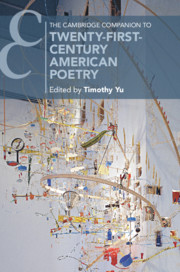Book contents
- The Cambridge Companion to Twenty-First-Century American Poetry
- The Cambridge Companion to Twenty-First-Century American Poetry
- Copyright page
- Contents
- Notes on Contributors
- Chronology
- Introduction
- 1 New Black Aesthetics: Post–Civil Rights African American Poetry
- 2 Traditions of Innovation in Asian American Poetry
- 3 Locations of Contemporary Latina/o Poetry
- 4 Sovereign Poetics and Possibilities in Indigenous Poetry
- 5 Changing Topographies, New Feminisms, and Women Poets
- 6 The Nearly Baroque in Contemporary Poetry
- 7 Disability Aesthetics and Poetic Practice
- 8 Queer Poetry and Bioethics
- 9 Trauma and the Avant-Garde
- 10 Blockade Chants and Cloud-Nets: Terminal Poetics of the Anthropocene
- 11 Give Me Poems and Give Me Death: On the End of Slam(?)
- 12 Anti-capitalist Poetry
- 13 Of Poetry and Permanent War in the Twenty-First-Century
- 14 Poetry in the Program Era
- 15 The Future of Poetry Studies
- Further Reading
- Index
- Cambridge Companions to …
- References
4 - Sovereign Poetics and Possibilities in Indigenous Poetry
Published online by Cambridge University Press: 25 February 2021
- The Cambridge Companion to Twenty-First-Century American Poetry
- The Cambridge Companion to Twenty-First-Century American Poetry
- Copyright page
- Contents
- Notes on Contributors
- Chronology
- Introduction
- 1 New Black Aesthetics: Post–Civil Rights African American Poetry
- 2 Traditions of Innovation in Asian American Poetry
- 3 Locations of Contemporary Latina/o Poetry
- 4 Sovereign Poetics and Possibilities in Indigenous Poetry
- 5 Changing Topographies, New Feminisms, and Women Poets
- 6 The Nearly Baroque in Contemporary Poetry
- 7 Disability Aesthetics and Poetic Practice
- 8 Queer Poetry and Bioethics
- 9 Trauma and the Avant-Garde
- 10 Blockade Chants and Cloud-Nets: Terminal Poetics of the Anthropocene
- 11 Give Me Poems and Give Me Death: On the End of Slam(?)
- 12 Anti-capitalist Poetry
- 13 Of Poetry and Permanent War in the Twenty-First-Century
- 14 Poetry in the Program Era
- 15 The Future of Poetry Studies
- Further Reading
- Index
- Cambridge Companions to …
- References
Summary
Contemporary Native American and Indigenous poetry is disrupting, crossing, and transgressing boundaries set up by settler states. Poetic possibilities reflect the movement and motions toward seriously engaging trans-Indigenous possibilities: coming to the table already knowing that we have had ways of speaking to and with each other since time immemorial, while also remaining attuned to the cultural specificity reflected in past craftmanship of earlier published poets. Sovereign poetics are a means of enacting and expressing a self-determined justice. Janet Rogers’s Peace in Duress offers a sovereign poetics that asserts the ancestral power of creation against state policies that seeks to normalize and erase Indigenous bodies. Qwo-Li Driskill’s “Map of the Americas” creates a map in relation to body parts, affirming Indigenous embodiments that belie the conventional map we have come to recognize. Layli Long Soldier’s Whereas rethinks the settler practice of telling history and then providing an insincere apology. Other poets discussed include Heid E. Erdrich and Leanne Betasamosake Simpson.
Keywords
- Type
- Chapter
- Information
- Publisher: Cambridge University PressPrint publication year: 2021
References
Works Cited
- 2
- Cited by



